If you’re here, you’re likely wondering how medicinal mushrooms like turkey tail may help to aid in your dog’s cancer treatment.
As dog people ourselves, we want to pass on our well wishes. Our pets are our family. And we wish you the best of luck no matter which path you take in your pet’s treatment.
So when we heard that some people were claiming that natural remedies like turkey tail were curing their dogs of cancer, we knew we had to put out an unbiased article on the subject.
In this article, we aim to address the research supporting turkey tail use for cancer in dogs, how it can work alongside chemotherapy, anecdotal and proven results, and how to actually administer the supplement.
Plus, we’ll review some commercial supplement brands in case you don’t have turkey tail lying around your backyard (like many of us).
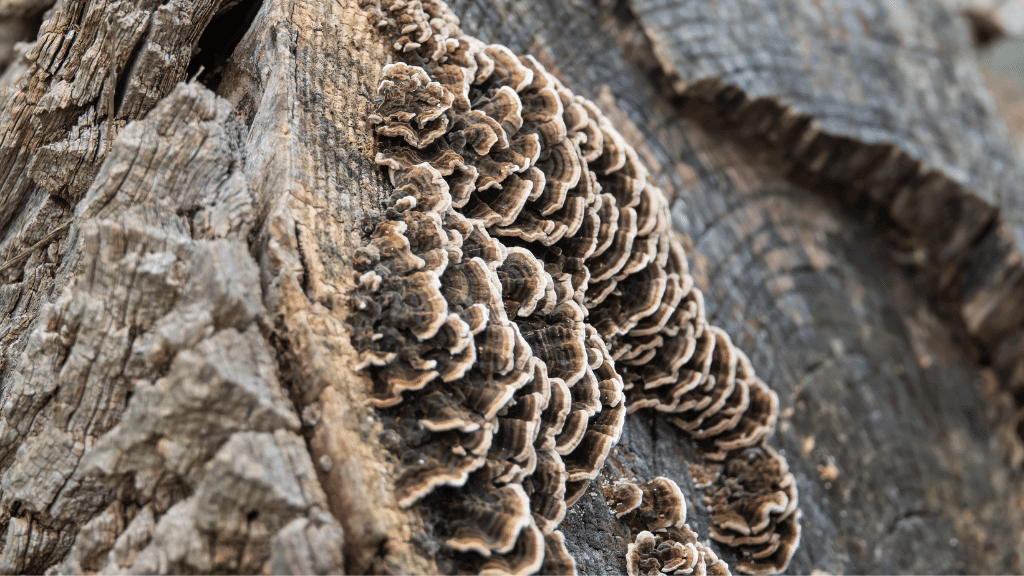
As always, we are here if you have any questions.
Turkey tail mushrooms for cancer in dogs
Your dog has cancer and nothing else you’ve tried has worked. The pain and suffering it’s enduring breaks your heart. And you’re wondering if natural supplementation with turkey tail is right for you.
Cancer isn’t curable, right? That’s what you’ve always heard, anyway. But if you read about the Doberman who is using natural remedies to prevent the metastasization of cancer, maybe you would think again.
First and foremost, if you are reading about these amazing mushrooms for dogs with cancer in order to help your own dog, please consult a medical professional first.
A lot of people have reported success in saving their pets, but there have also been plenty of reported failures.

It’s not uncommon for veterinary professionals to be unfamiliar with the application of medicinal mushrooms and other herbal remedies for your pets. That’s why it’s important for you to work closely with them to ensure anything you’re adding or removing from your dog’s daily routine will not affect the efficacy of standard cancer treatments.
With that in mind, let’s walk through some of what we know, what we don’t know, and more about this powerful medicinal mushroom.
What are turkey tail mushrooms?
Turkey tail mushrooms, also known as Trametes versicolor, are a wild species of wood-loving mushroom. They’re named for their distinct color pattern which resembles - you guessed it - a turkey’s tail.
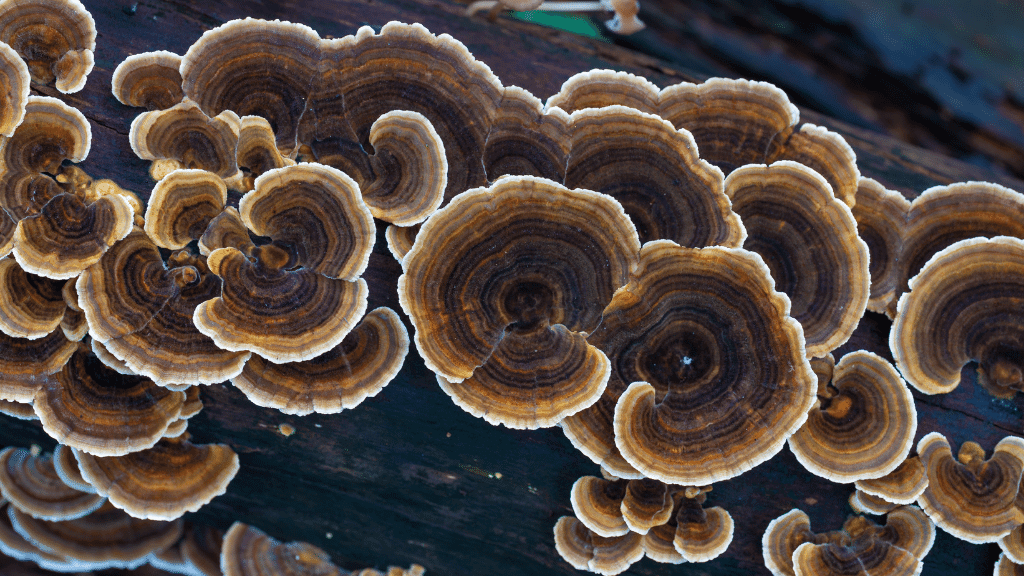
Due to its extremely high protein content and potent anti-inflammatory properties, turkey tail mushrooms have been used in traditional Chinese medicine for centuries. It is currently being researched for its cancer-fighting properties. Turkey tail mushrooms are sold in supplement form and can be found at health food stores. And supplements are easy to find online as well.
If you’re looking for scientific studies on turkey tail, try using the scientific name, Trametes versicolor, which is most likely to generate accurate results in your searches.
Why do people use turkey tail mushrooms as a cancer treatment for dogs?
Turkey tail mushroom is used in mushroom supplements for dogs with cancer to attack cancer cells. But how does it work?
Turkey tail mushrooms contain beta-glucan polysaccharides, which are thought to stimulate natural killer cells, boosting your dog’s immunity and healing abilities.
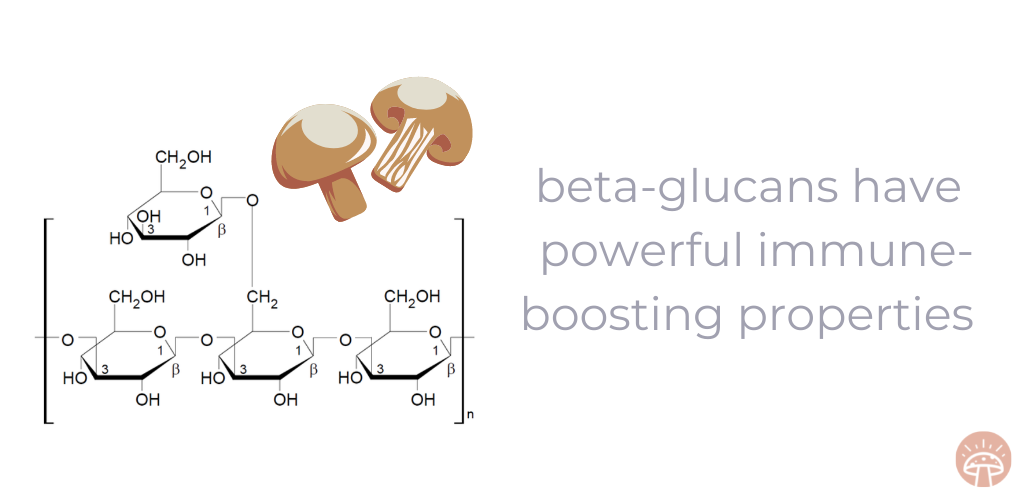
Beta-glucans can be found in a number of mushrooms and other foods. But they’re especially high in turkey tail mushrooms.
It may also increase apoptosis—the death of diseased cells—which helps fight cancer. Turkey tail also has anti-inflammatory properties that help reduce inflammation in animals suffering from cancer.
Here are some other foods that are really high in beta-glucans: 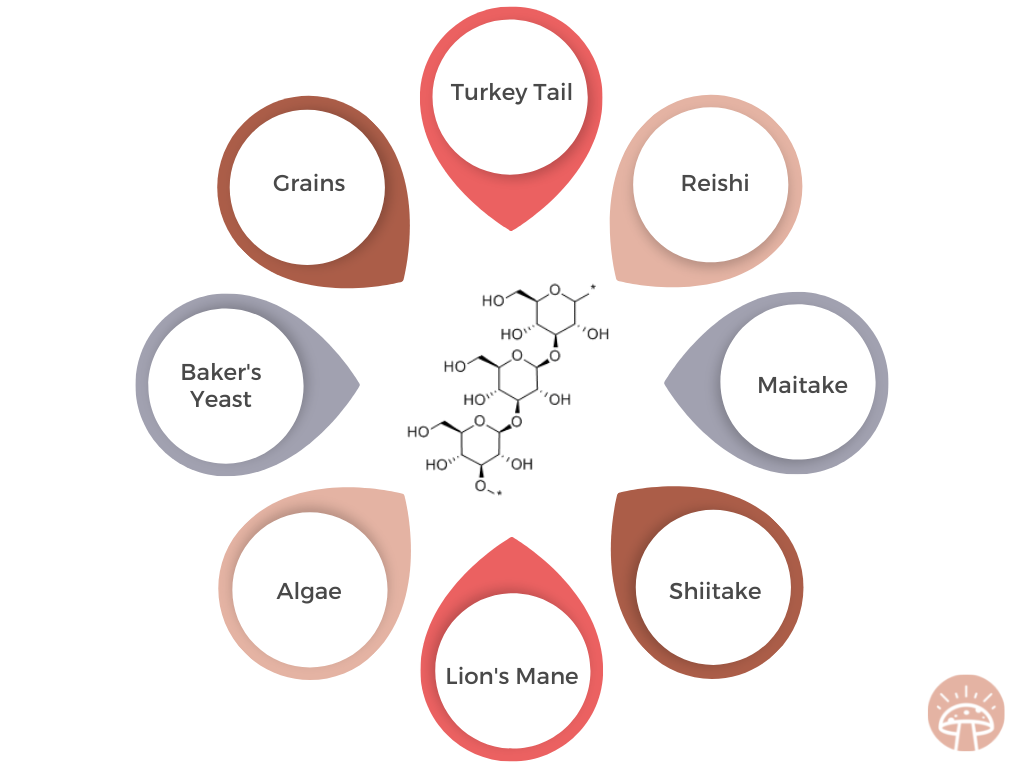
Check out our complete guide to fungal beta-glucans to learn more.
Scientific evidence pointing to turkey tail as a cancer treatment for dogs
It’s important to note that while various studies have been done in vitro, on mice, and in humans, that the results can’t necessarily be extrapolated to dogs. However, correlations between animal and human studies are usually considered.
So far, research on mushroom extracts for cancer in dogs is extremely limited and hasn’t always been successful.
For example, a small study of turkey tail-derived immunity mushroom supplements in dogs with lymphoma found no improvement in survival times or quality of life. However, we feel it’s important to note some of the limitations of this particular study, which is referenced widely to justify not using turkey tail:
- The study size was very small and contained no control group with which to compare results
- The study didn’t use a standardized method to measure quality of life, and relied on pet owners to rate the dogs on a scale from 1-10
- The supplement used contained several other mushroom types and also contains mushroom mycelium, which has very limited clinical research
But it is important to include. Because not every scientific application of turkey tail has led to success. And knowing that may help you set reasonable expectations about your dog’s treatment results using turkey tail.
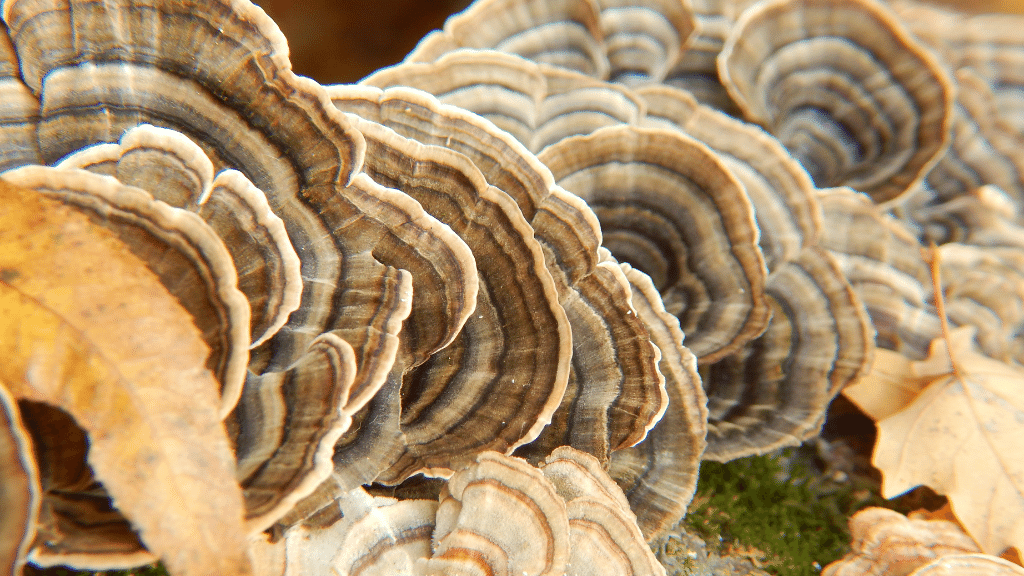
Successful clinical trials and scientific studies of turkey tail for cancer in dogs
Another study by Pennsylvania’s school of veterinary medicine showed vastly different results.
According to the study, 15 dogs were given turkey tail supplements after being diagnosed with a very aggressive type of cancer.
While the median survival rate of dogs with this type of cancer averages around 86 days - there were some dogs in this study who lived for over a year with no additional treatments other than turkey tail mushroom supplements. In fact, dogs that were given the highest dosage had the highest median life span, more than 199 days.
“The results were so surprising, in fact, that the researchers asked Penn Vet pathologists to recheck the dogs’ tissue biopsies to make sure that the dogs really had the disease.”
Again, this study was very small and limited. But the results point to some of what the anecdotal evidence showcases as far as the potential effectiveness of turkey tail supplements for cancer.
While it is easy to assume that turkey tail mushroom can be used in place of chemotherapy and radiation, many people report using it alongside traditional treatments. You might consider using turkey tail if chemotherapy is inaccessible to you - physically or financially. But we can’t recommend it as a replacement treatment until there is more evidence to support that. There is a reason chemotherapy has been used for so long. And that’s because the results are more tangible.
Work with your veterinarian to determine which treatment path - or combination of treatments - is right for you.
We put together a complete guide to the benefits of turkey tail mushrooms which you can read here.
When it comes to cancer studies for turkey tail, clinical results are limited.
Below is an excerpt from the cancer benefit section of that article:
- Antitumor study: In a study conducted on PSP effects on anti-tumor properties, it was found that PSP increased white blood cell count, making it an effective treatment enhancer.
- Colon cancer study: In a study that measured PSK effectiveness in treating colon cancer cells, it was found that PSK suppressed the development of new colon cancer cells.
- Gastric cancer study: In Japan, a study was conducted on 262 patients that were randomly assigned either standard gastric cancer treatment or treatment supplemented with PSK. Results showed that PSK improved both the five-year disease-free rate and five-year survival rate overall.
- Leukemia study: When looking at turkey tail as a potential treatment for leukemia, scientists conducted an in-vitro study (e.g., a study conducted on cells outside of a living organism). Over a three-day period, growth suppression and viability of the leukemic cells was shown.
- Breast cancer study: In a study conducted on women diagnosed with breast cancer stages 1 through 3 who had undergone surgery and chemotherapy, 9 grams of turkey tail was given daily to measure immune response. It was shown to be safe and effective, with positive indication that supplementation helped with immune response.
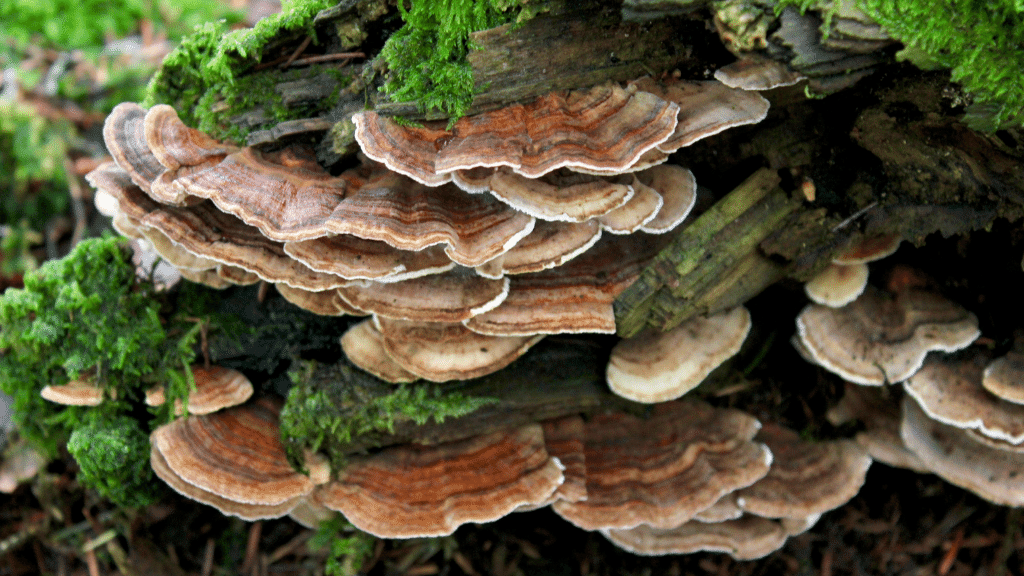
We put together a complete guide to turkey tail for human cancer patients here.
Anecdotal evidence of turkey tail for cancer in dogs
One of the reasons why turkey tail mushrooms are growing in popularity is because of a seemingly overwhelming volume of anecdotal evidence from pet owners who have tried it.
Perhaps you heard about it from a friend yourself, which is why you’re here.
But the reality is, there simply isn’t enough tangible, quantifiable scientific evidence to point to whether turkey tail supplements are a viable treatment for cancer in dogs. More research needs to be done to determine the proper extraction methods, dosage, side effects, how supplementation can align with traditional therapies, like chemotherapy, and more.
For example, if your dog is receiving chemotherapy, certain supplements may interact with those drugs and lower their effectiveness.
Some supplements might also interfere with antibiotics.
It’s important to weigh these potential risks against any potential benefits before using mushroom supplements for cancer in dogs. We simply don’t have a strong understanding of how these treatments can work together effectively.
But despite this fact, many pet owners are willing to try natural supplements anyway. For some, the anecdotal evidence is evidence enough.
We can’t tell you what’s right or wrong either way. But if you’re hoping to try turkey tail supplementation for your dog’s supportive treatment, we can help you determine how to do it in the best way based on what we know today.
As always, consult a veterinarian before trying these mushrooms for dogs with cancer—and also make sure you buy them from a reputable source!

What to look for in a turkey tail supplement for cancer
There are hundreds of mushroom supplements for dogs with cancer. These differ in both their active ingredients and also in their dosage strengths.
And unfortunately for many pet owners, there simply isn’t any regulation at all in the mushroom supplement space. There is no standardized test to prove that what you’re buying is actually turkey tail mushroom extract.
Common marketing tactics make it easy for shady supplement companies to target buyers who don’t know any better and sell them.
Here’s what to watch out for when buying turkey tail supplements for your dog:
- Mushroom mycelium: Often branded as “whole mushroom” or “full spectrum” mushrooms, this is just clever branding for selling you what is - in many cases - mostly mushroom mycelium. Mycelium is the root-like structure that supports the fruiting body (the mushroom cap). While there is some debate over whether the fruiting body is more medicinally beneficial, there is no question that the highest concentration of beta-glucans appears in turkey tail’s fruiting body. Which is why you should only buy products that use 100% fruiting body OR the company is providing lab tests on the primary compounds, like beta glucans.
- Mushroom powder vs extract: Mushrooms have a tough cell exterior wall called chitin. Chitin is also found in shrimp and crab shells. So you can imagine how difficult it is for our bodies (and our dog’s bodies!) to digest. Hidden underneath that crab-like cell wall are the powerful polysaccharides which have been studied for cancer treatment. In order for your dog to access those medicinal compounds, the mushroom has to be extracted using a hot-water extraction method. Which is why most studies use turkey tail EXTRACT and not the simpler ground up turkey tail mushroom. Extraction is critical, so make sure you buy a product that is transparent in their extraction methods.
- 100% turkey tail: while other mushrooms like reishi and chaga have shown powerful anti-cancer benefits, some supplements mix in less expensive mushrooms into their product in order to make more profit. Be sure to read your label carefully! Learn about other mushrooms for cancer in our complete guide.
- Guaranteed beta-glucan percentage: In full transparency, there simply isn’t a great standardized testing method for beta-glucans. But reputable companies have made a strong effort to test and publish their guaranteed beta-glucan percentages. Note that grain (like rice) is technically a polysaccharide. So make sure you aren’t just looking at POLYSACCHARIDE percentages, and that beta-glucans are listed on your label!
Because there is so much noise in the mushroom supplement space, it can be really hard to determine which products are the most reputable. Let’s talk about some of the most trusted brands.
Here's a complete guide to turkey tail supplements for more on this subject.
Remeday’s trusted turkey tail supplements for dogs
We’ve done a lot of research into the top supplement brands. And many of the same supplements that are safe for humans are also safe for dogs. But that’s not always the case!
Here are our top recommendations for turkey tail supplements for dogs undergoing cancer treatment:
1. RealMushrooms - Turkey Tail Supplement Capsules for Pets

100% organic, 100% fruiting body, pre-extracted, perfectly formulated, and easy to administer, these supplements are the ideal choice for dog owners looking to make turkey tail administration easy and affordable. All while ensuring the product actually contains what it claims. We would give this supplement to our dogs if they were undergoing cancer treatment. Plus, they guarantee the beta-glucan percentage at higher than 30% – which is quite high.
2. FreshCap - Turkey Tail Supplement Powder
FreshCap is another trusted name in the industry. They also utilize 100% organic, 100% fruiting body, and pre-extracted methods. This company is based in Canada, while RealMushrooms is US-based which is the only core difference between these two great companies. FreshCap’s beta-glucan percentage is slightly higher, boasting 35% beta-glucans. Which is why we are including it here as well.
For the record, we do not recommend brands that are using mycelium-based products or are offering products that aren’t extracted.
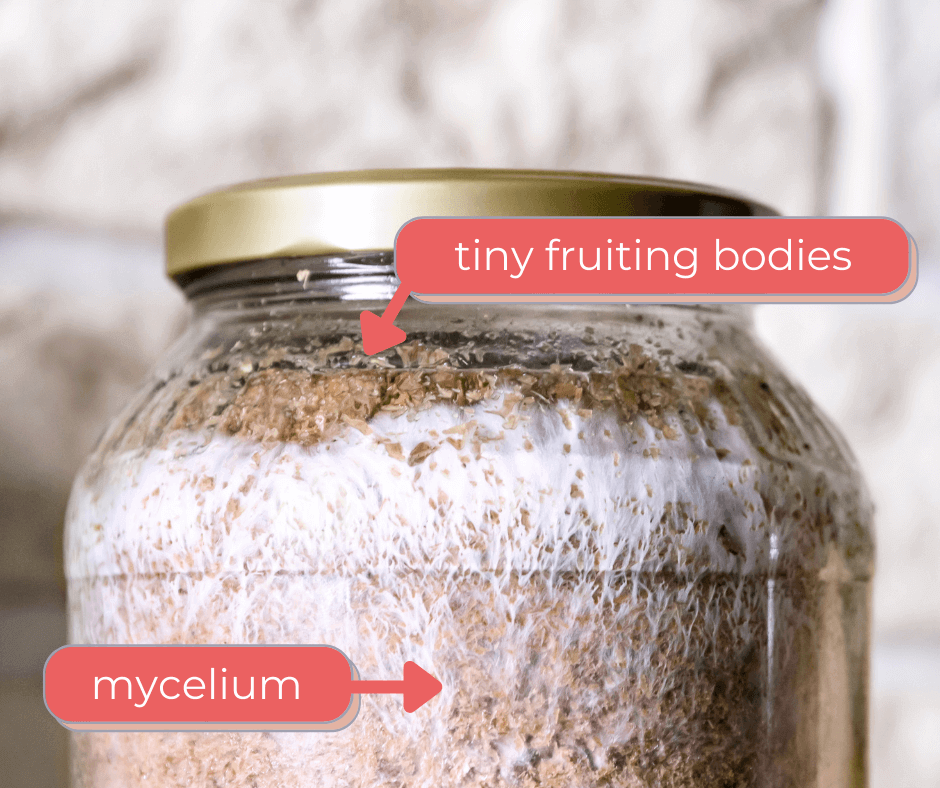
Until we know more about mycelium-based and non-extracted mushrooms, we can’t recommend these products to those looking to give their dogs the best chance at maximum medicinal potential.
And remember, you don't necessarily need to choose a supplement brand marketed for dogs - just make sure your supplement doesn't contain other additive ingredients that could be harmful. Most human mushroom powder and capsule supplements are safe for dogs as well.
How to dose turkey tail mushrooms for dogs
There are two primary ways you can give turkey tail mushrooms to your dog:
- Use capsules, which are easy to hide in some of your dog’s favorite treats or bury in their food
- Use powder, which is easy to mix with a broth and add to their kibble
If you’re looking to use whole raw mushroom, make sure you fully dry, grind (or finely chop) and extract it into a tea first.
Powder and capsules are going to be your best bet at long-term and easy administration. And if you use a trusted brand, you can reasonably expect the same results as turkey tail you’ve found in your yard.
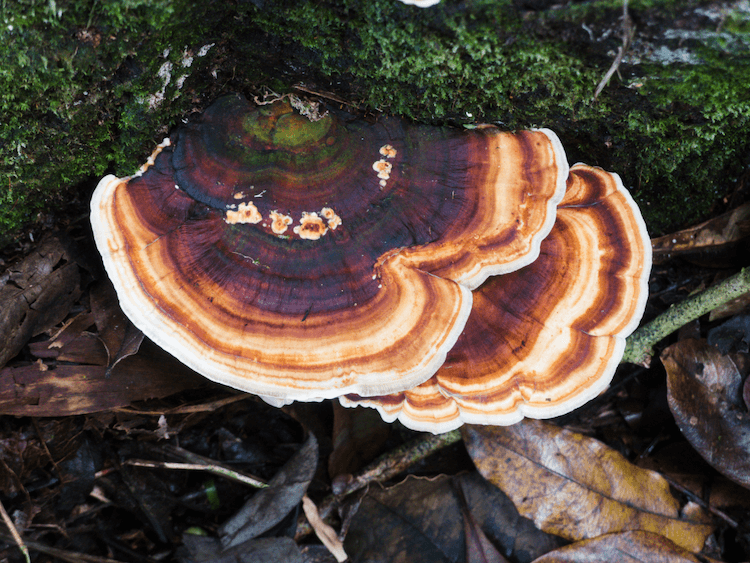
There is no standard dosage recommendation. And it’s unclear whether the dosage should vary based on the dog’s weight.
In the Penn Vet study, the following dosages were used:
Divided into three groups of five, each group received a different dose — 25, 50 or 100 mg/kg/day. There were not statistically significant differences in survival between the three dosage groups, though the median survival time was highest in the 100 mg group, at 199 days, eclipsing the previously reported median survival time.
The good news is, mushrooms are a healthy fungus and are generally considered safe to give to your dog.
Pending there isn’t another treatment or medication with which the turkey tail supplementation may interfere, we recommend administering between 25 - 100 mg of turkey tail extract per day. Some sources also recommend giving supplements only on the days when your dog isn’t receiving chemotherapy. But again, this is a decision you should make with your vet.
With that said, we believe that dosage to be really quite low. Dogs should be able to tolerate higher doses of mushroom extract. In one study, mice were given 1,000 mg of turkey tail a day for 28 days and showed no signs of toxicity.
So I think we can reasonably assume a much larger dog can tolerate higher dosages.
A good rule of thumb for dosing turkey tail supplements for your dog is 1g of turkey tail per 25 lbs and splitting that dosage into twice daily treatments.
You may consider adjusting that dose based on the severity of your dog’s situation, the other medications and treatments being administered and what your holistic vet recommends.
For example, a 100lb dog would get 4 grams of turkey tail. Two in the morning, and two at night.
What are the possible side effects of turkey tail supplements for dogs?
The most common adverse reaction is likely to be upset stomach or an allergic reaction. That’s why we highly recommend starting with very small doses and allowing your dog some time to see how they may or may not react. Of course, notify your vet as well so they are aware of the new supplementation you’re giving your dog.
There isn’t enough research right now to showcase the other potential side effects. But serious reactions can’t be ruled out. So start slow and always under the care of your vet.

Again, the research isn’t clear about how supplementation should change based on your dog’s weight. But I think we can reasonably assume the dosage can be altered to factor that in. For example, a much larger dog may be able to tolerate higher doses than a smaller one.
If your dog was cleared of cancer and you’re looking for maintenance, try cutting the daily dose in half for long-term use.
Can you use turkey tail for dogs alongside chemotherapy?
Sources differ on this subject. Some sources state that turkey tail shouldn’t be used alongside chemotherapy. Other sources suggest using turkey tail instead of chemotherapy. Still others suggest using turkey tail on the days when your dog isn’t having chemotherapy to support the effectiveness of the treatment.
Turkey tail, in general, is considered a safe supplement. As long as your vet is on board, you can try using turkey tail alongside traditional cancer treatments.
But until there is more research completed, we can’t give you a solid recommendation here. Work with your vet to determine the best approach.
We wish you the best of luck on your treatment journey with your pet.







.png)
